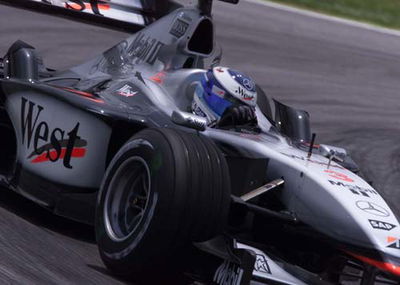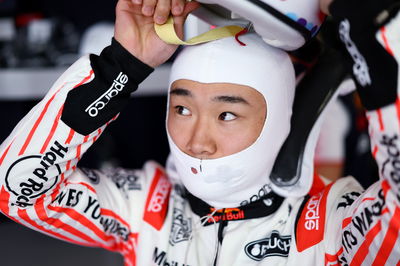Q&A: Mick Ainsley-Cowlishaw - Arrows.
Mick Ainsley-Cowlishaw, Arrows' Race Team Manager talks about his life in Formula One:
Q: On responsibilities.
Mick Ainsley-Cowlinshaw: On a day to day level, I'm responsible for the running of the race team: travel, flights, hotel accommodation and all the bits and pieces. All matters regarding the race team, first of all. Recruitment, organisation...everything basically. Obviously, at the circuits I'm involved in the actual race strategy. Hopefully the input I put in has some kind of effect on the situation.
Q: On race weekend routine.
Mick Ainsley-Cowlishaw, Arrows' Race Team Manager talks about his life in Formula One:
Q: On responsibilities.
Mick Ainsley-Cowlinshaw: On a day to day level, I'm responsible for the running of the race team: travel, flights, hotel accommodation and all the bits and pieces. All matters regarding the race team, first of all. Recruitment, organisation...everything basically. Obviously, at the circuits I'm involved in the actual race strategy. Hopefully the input I put in has some kind of effect on the situation.
Q: On race weekend routine.
Mick: A race weekend is meetings - we have FIA meetings on Thursday, and we have meetings regarding the team. Every day is meetings basically, in between running time when the cars are actually on track.
Typically a Saturday is a very, very long day because we start running at 9am in the morning and our minimum preparation is 2 hours plus before to give ourselves plenty of time to get organised. 5.30-5.45am is usually the leave time from the hotel and if we're lucky, we may get out of the circuit by midnight. So it's quite a long day. And Sunday obviously is a long day as well, but the race finishes at 4-4.30pm and then you've got to start and pack up...!
Q: On life at Leafield.
Mick: Basically all I've done since I've got back from Malaysia is catch up on paperwork, because it doesn't stop. Now we're into Imola and beyond - we are always working two or three races ahead, in terms of organising hire vehicles, hotels, generators etc
Q: On tough moments in the job.
Mick: The tester for me was only having just come into Arrows, and getting a race car and a load of freight back from Australia to go testing at Silverstone and then get it back out to Malaysia. That was quite interesting, but it was fine, we did it in the end. I'm definitely learning by experience!
Q: On getting into F1.
Mick: Originally I used to go motor racing at weekends when I was about 16 with a guy who had a garage in my local town. He used to prepare cars for other people so I got involved in the sport from a very early age really. After leaving school, I worked for this guy for 10 years which provided a real learning curve. I did a bit of racing through that period in all sorts of formulas - F3 , Formula Ford and Saloons.
Then in 1980 I started at Tolman's F2 team. Roger (Silman, who is one of the directors at Arrows) gave me the opportunity of starting in motor racing full time. And then in 1981, Tolman's went into F1 so I carried on with them until 1983 when they were taken over by Benetton. So, from 1984 onwards it was Benetton and I left in 2000, so I was there 20 years basically.
The highlight was winning the Constructors' World Championship for sure. We won two Drivers' Championships and one Constructors' Championship. For a mechanic though, it's the Constructor's Championship which means the most because that is you. Your reliability record and what you put into it, so winning that was very satisfying.
Q: On leaving Benetton and joining Arrows.
Mick: What prompted me to leave Benetton was the opportunity to become Team Manager at Arrows. I had been at Benetton for such a long time. With the Renault situation things had changed, so for me it was an ideal time to get out. Looking at it now from the outside looking in, it was definitely the right choice. The opportunity arose here, Roger gave me another chance to try something else and I'm enjoying it - its brilliant.
Arrows is completely different. It feels a bit like Benetton a few years ago. The difference with Benetton is that they have a massive budget - whatever you want to do you can do. Here it's different - you really have to think about what you're doing. We don't have a bottomless pit of money so everything needs weighing up and justifying. We have to be careful.
It's good in a way cause it makes you think harder to try and come up with a cunning plan without blowing the pot!
Q: On learning a new role.
Mick: I started on January 2nd and the first month before I actually went to my first test with Arrows, it was very daunting because there was so much to try and learn in a very short space of time. Now I'm into my second month, so it's getting better. The big difference is coming at things from a different angle. At Benetton, it was completely different - I had been chief mechanic for 10 years and my job was the car - whereas here my role encompasses everything, so there's much more responsibility and there is much, much more to learn.
Q: On highs and lows so far.
Mick: I've been pleased with the performance but disappointed, because I feel for the first 2 races we should have had points really, but that's just me. I've really enjoyed all my time here so far and am looking forward to getting on and improving things.
The only downside is paperwork - there's a lot of it and it doesn't stop. Just because you're away for 10 days or whatever, when you come back there is 10 days worth of paperwork to get through and we're always planning ahead so I'm getting used to it though because now I expect it!
Q: If you could change one thing in F1.
Mick: If it was left up to me, I would like to bring it more back into the drivers hands. Now it's all electronics, gadgetry and money. The amount of money you've got dictates how much better you can be than your rival because you can employ more people and devote more money to electronic gadgets. I'd rather put a gear stick back in there and steel brakes, then see how we get on.
I'd like to see the end of all the hidden bits and pieces that some people have got on their cars that are illegal basically. After Barcelona this year, traction control will be legalised and anybody can use it, so at least the people that haven't been doing it will be able to do it, and they'll be able to get an advantage out of it.
Q: On balancing work and home lives.
Mick: What home life?! Being at Benetton was difficult, as you were away a lot, but I did actually get a bit of free time. Here, I'm still learning and I've yet to find a balance between home life and working. I didn't get married until I was 40 and my wife has her own business so she's as busy as I am, sometimes more busy than me! But we try and find a happy medium - you have to.
It's very hard. There are a lot of problems with people's relationships in motor racing and there are loads of cases where people have split up over it, just because they are away so much and the hours are so long but then again the rewards from it - not only financial but all the rewards from it - are amazing.
Q: On staying in F1.
Mick: At the present time, I am more than enthusiastic and I'm learning which is a good thing. So for me now, I'm fine. But whether the people that actually run the company think I'm doing a good enough job is another thing. Motor racing can be a bit like that, particularly when you're in a high position. You can find yourself out of a job in a couple of months.
Q: On staying motivated and enthused?
Mick: Probably because I'm a racer really and I want to succeed. This is a new challenge for me - I want to try and mark my mark here, improve things and try and win races. And get on to win the world championship - that for me would be fantastic.











